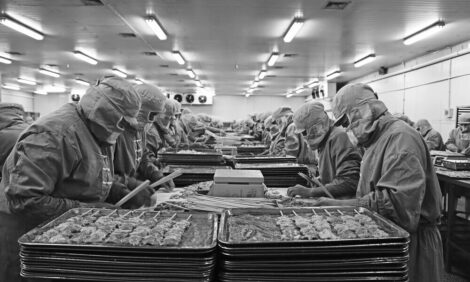



Probiotics protect poultry from pathogens
US - Agricultural Research Service scientists in Fayetteville, Ark., have found several promising intestinal bacteria that could protect live chickens from Salmonella, Campylobacter and other pathogens that cause foodborne illness in people who eat poultry.
Probiotics protect poultry from pathogens - US - Agricultural Research Service scientists in Fayetteville, Ark., have found several promising intestinal bacteria that could protect live chickens from Salmonella, Campylobacter and other pathogens that cause foodborne illness in people who eat poultry.
To prevent contamination of the meat, it's important to prevent the pathogens from taking hold inside the intestinal tracts of the live birds. ARS scientists are getting a better understanding of how live beneficial bacteria, called probiotics, influence the gut's microbial environment and interact with other bacteria. Probiotics contribute to the intestinal tract's health and balance. They are given orally to poultry to help the birds fight illness and disease.
Annie Donoghue, a poultry physiologist at ARS' Poultry Production and Product Safety Research Unit in Fayetteville, is leading a team of ARS and University of Arkansas researchers in finding new, healthful bacteria that, when fed to live birds, help them resist harmful pathogens and grow more efficiently.
Using a concept known as competitive exclusion, probiotics are fed to newly hatched poults. Once inside, the probiotics occupy sites in the young bird's intestinal tract where the pathogens would normally attach and grow. Since probiotics get there first, they reduce the opportunity for pathogenic bacteria to become established in newly hatched poults when they are most susceptible to infection.
The team has already screened more than 4 million intestinal isolates to come up with several promising probiotic combinations. The University of Arkansas and ARS have filed a patent on the selection techniques.
By using preselected "good" microbes, the researchers hope to produce inexpensive, identified bacterial cultures with the ability to reduce or exclude specific pathogens and enhance enteric health in poultry. They have developed multiple in vitro selection systems for identifying potential probiotics.
These new selection techniques make probiotics production less expensive. This could lower the price of poultry and make it less likely to be a source of foodborne illness.
Source: USDA Agricultural Research Service - 15th January 2004
 |
 |
Annie Donoghue, a poultry physiologist at ARS' Poultry Production and Product Safety Research Unit in Fayetteville, is leading a team of ARS and University of Arkansas researchers in finding new, healthful bacteria that, when fed to live birds, help them resist harmful pathogens and grow more efficiently.
Using a concept known as competitive exclusion, probiotics are fed to newly hatched poults. Once inside, the probiotics occupy sites in the young bird's intestinal tract where the pathogens would normally attach and grow. Since probiotics get there first, they reduce the opportunity for pathogenic bacteria to become established in newly hatched poults when they are most susceptible to infection.
The team has already screened more than 4 million intestinal isolates to come up with several promising probiotic combinations. The University of Arkansas and ARS have filed a patent on the selection techniques.
By using preselected "good" microbes, the researchers hope to produce inexpensive, identified bacterial cultures with the ability to reduce or exclude specific pathogens and enhance enteric health in poultry. They have developed multiple in vitro selection systems for identifying potential probiotics.
These new selection techniques make probiotics production less expensive. This could lower the price of poultry and make it less likely to be a source of foodborne illness.
Source: USDA Agricultural Research Service - 15th January 2004








